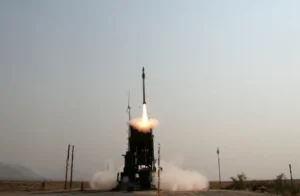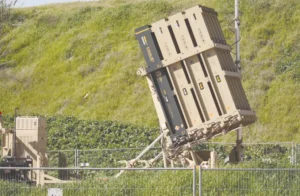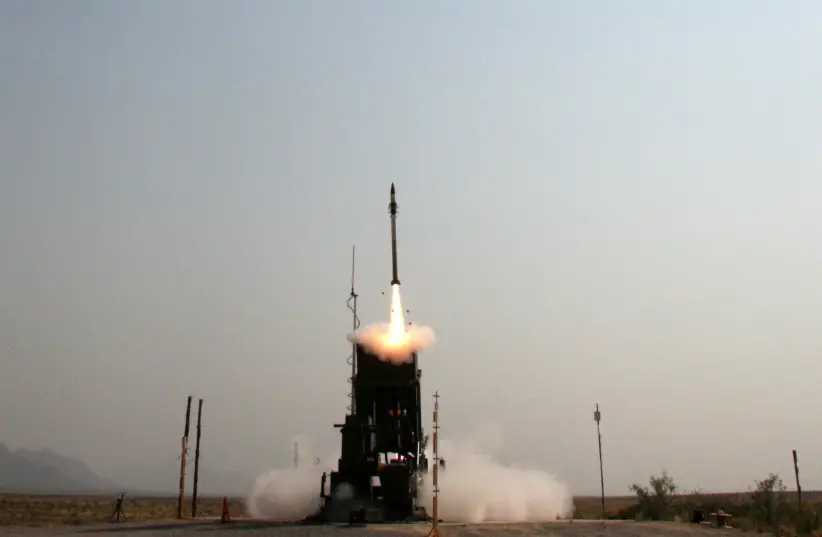One of Biden’s first meetings during his visit will be to view the country’s Iron Dome and the new Iron Beam laser defense system.

With the visit of US President Joe Biden to the Middle East this week, Israel’s defense establishment will show off the country’s multilayered missile-defense umbrella in the hopes of pushing their combat-proven systems abroad.
One of Biden’s first meetings during his visit to Israel and Saudi Arabia on Wednesday will be at Ben-Gurion Airport, where he will meet with Defense Minister Benny Gantz and view Israel’s Iron Dome and its new Iron Beam laser-defense system.
The ground-based, high-powered laser is in its advanced stages and will be used alongside the Iron Dome to intercept aerial threats, such as rockets and drones. It will also be able to handle rocket barrages.
Israel will likely ask Biden for funding for the project, which the Defense Ministry’s Directorate of Research and Development (DDR&D, or MAFAT in Hebrew) has already advanced to its second generation.
Unlike other systems, the Iron Beam is not yet operational and is not expected to be for at least three more years.

However, countries around the globe have shown interest in other combat-proven systems that have been used by Israel, such as the Arrow and Barak missile-defense systems.
Arms export
In 2021, Israeli arms exports soared to an all-time high of $11.3 billion from $7b. the previous year.
According to the military exports unit of the Defense Ministry (SIBAT), in 2021, Israeli companies exported missiles, rockets and air-defense systems; drone systems and UAVs; radars and electronic warfare; manned aircraft and avionics; weapon stations and launchers; ammunition and armaments; intelligence, information, cyber systems and more.
A senior defense official recently said due to the war in “Ukraine, as well as the overall situation in the world, we are striving to increase the production of Israeli defense industries by tens of percent and to expand cooperation.”
“We are opening production lines and preparing for this situation,” the official said.
In a recent briefing to journalists, Gantz said since the signing of the Abraham Accords in 2020, Israel has been working with countries in the region and has increased its military-to-military ties. Israel has signed more than $3b. worth of defense deals, he said.
Biden and Gantz are also expected to discuss the idea of a regional air-defense alliance, which Gantz has touted in recent weeks as already having had success in downing Iranian aerial threats.
Gantz has said Israel is building a US-sponsored “Middle East Air Defense Alliance” (MEAD), which has already thwarted threats and “will strengthen the cooperation between Israel and countries in the region.”
“The Middle East Air Defense Alliance is already operative and has already enabled the successful interception of Iranian attempts to attack Israel and other countries.”
Defense Minister Benny Gantz
“This program is already operative and has already enabled the successful interception of Iranian attempts to attack Israel and other countries,” he told the Knesset Foreign Affairs Defense Committee in June.
Arab states have not yet commented on MEAD. The campaign to thwart Iran’s regional plans is taking place across the Middle East, with a “regional alliance” of the US, Israel, the Gulf States (Saudi Arabia, the UAE, Bahrain and Kuwait), Egypt and Jordan, as well as Qatar, Oman, Sudan and Morocco, Maj.-Gen. Eyal Zamir said in a recent paper.
According to a senior defense source, Iran and its proxies have launched more missile and UAV attacks against Gulf States than at Israel. As rocket and drone attacks by Iran have increased, there have been talks between Israel and several Gulf states to understand what is most relevant to counter the threats. The countermeasures may include a regional alliance, an implementation of defense systems or both.

